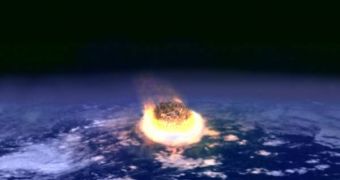Experts at the University of Colorado in Boulder (UCB) recently argued that the meteors that rained down on our planet approximately 3.9 billion years ago did not cause early life on Earth to disappear, and then reappear later. They said that, regardless of the fact that some of these meteor were the size of Kansas, they couldn't have packed sufficient firepower to destroy “entrenched” bacteria living on the ocean floors. In addition, it may be that these catastrophic impacts actually aided the development of complex life, by boosting tectonic activity and therefore heating the planet from the inside.
In charge of the new research were Oleg Abramov, a UCB research associate, and Stephen Mojzsis, a professor of geological sciences at the university. The results of their investigations, published in the May 21st issue of the scientific journal Nature, show that the meteorites that impacted Earth nearly 4 billion years ago did not have the capacity to sterilize the planet. Using computer simulations, they actually proved that not even showers 10 times stronger than the ones that actually existed could have destroyed all microbes and bacteria.
That is to say, if in our planet's early life 10 times more meteors had struck Earth, they would have had the ability to vaporize the oceans and to extinguish all life on the surface. The thing is though that nothing lived on the surface at that time. Bacteria and microbes were either dug up in the ocean floors, or living around hydrothermal vents, where they can still be found today. Plus, the abilities that bacteria have of adapting themselves to any kind of environment are legendary. They now live under miles of ice, atop the tallest mountains, inside volcanoes and vents, and also in hundreds of feet of rock, feeding on the byproducts of the natural decay of uranium, in deposits.
“Even under the most extreme conditions we imposed, Earth would not have been completely sterilized by the bombardment,” Abramov said, quoted by ScienceDaily. “So it is not unreasonable to suggest there was life on Earth before 3.9 billion years ago. We know from the geochemical record that our planet was eminently habitable by that time, and this new study sews up a major problem in origins of life studies by sweeping away the necessity for multiple origins of life on Earth,” Mojzsis added. They argue that the finds push back the estimated data when life first appeared on the planet.
“Exactly when life originated on Earth is a hotly debated topic. These findings are significant because they indicate life could have begun well before the LHB, during the so-called Hadean Eon of Earth's history 3.8 billion to 4.5 billion years ago,” concluded NASA's Exobiology and Evolutionary Biology program manager, Michael H. New. He also works as an Astrobiology Discipline Scientist for the American space agency.

 14 DAY TRIAL //
14 DAY TRIAL //